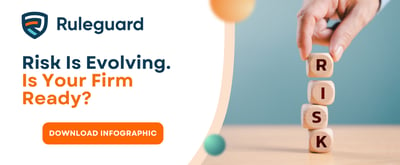Author: Richard Rivett - GRC Solutions Consultant
Topics: Risk, Compliance, Governance, Technology, Culture
Regions and Regulators: Global, Europe, UK
In financial services, GRC and RegTech play a central role in building operational resilience, maintaining stakeholder trust, and meeting regulatory expectations. Yet, many organisations continue to rely on manual, fragmented processes that are no longer fit for purposes in today’s fast-changing environment.
The risk isn’t always obvious. In many firms, these legacy approaches have worked “well enough” - spreadsheets are maintained, audits are passed, and no major incidents have occurred. But as the regulatory landscape evolves and operational complexity increases, this reactive posture is becoming unsustainable.
In short: the existing tools have become the risk itself.
Legacy approaches are creating unseen vulnerabilities
While manual tools may still function on the surface, they carry significant limitations:
- Lack of visibility: Without centralised, real-time data, it’s difficult to gain a true picture of risk exposure or control performance.
- Increased human error: Spreadsheets and siloed systems are prone to inconsistencies, versioning issues, and oversights.
- Slow response times: When issues arise or regulations change, teams are often left scrambling to adapt.
- Dependency on key individuals: Knowledge often sits with a few people, creating operational risk if they move on.
As financial services become more interconnected and digitally enabled, these vulnerabilities are magnified and the cost of managing them reactively increases.
Regulatory expectations are evolving — and increasing
Across the UK and Europe, regulators are shifting their focus beyond basic compliance. The emphasis is now on demonstrable, embedded risk management practices that are forward-looking, data-driven, and resilient by design.
Frameworks such as the Senior Managers and Certification Regime, Operational Resilience, and the EU’s Digital Operational Resilience Act require firms to show:
- Clear accountability
- Timely risk identification and escalation
- Tested control frameworks
- End-to-end visibility of third-party and technology risk
Achieving this with legacy tools alone is increasingly difficult — and unlikely to meet the standards set by regulators or internal governance committees.
Technology as an enabler of resilience and efficiency
Modern GRC and RegTech platforms are designed to address these challenges head-on. Rather than layering technology on top of existing processes, they streamline, connect, and automate risk and compliance activities across the organisation.
Key benefits include:
- Integrated risk oversight across all business functions
- Automated workflows for policy management, incident response, and control testing
- Real-time dashboards and reporting, providing clarity for senior leadership and board-level governance
- Regulatory agility, enabling quicker adaptation to new requirements
- Scalable solutions that grow with your business, products, and regulatory footprint
By investing in the right GRC and RegTech solutions, firms can move beyond reactive compliance and embrace a more proactive, strategic approach to risk management - unlocking value that extends well beyond the avoidance of fines or regulatory findings.
Early integration of GRC and RegTech also plays a critical role in reducing long-term IT complexity and integration costs. In contrast, continued reliance on outdated legacy systems only adds to an organisation’s ‘tech-debt’, compounding operational inefficiencies and making future transitions significantly more costly and disruptive.
The business case for action
Delaying system modernisation often stems from concerns around cost, disruption, or internal bandwidth. However, the cost of inaction can be significantly higher - in the form of audit gaps, regulatory scrutiny, lost productivity, and reduced stakeholder confidence.
Moving to a more modern, integrated GRC approach that crucially incorporates RegTech enables:
- Improved decision-making, supported by reliable, up-to-date data
- Enhanced control, through automation and clear accountability
- Greater resilience, both operationally and reputationally
This shift is more than a compliance exercise - it’s a strategic investment in long-term sustainability and risk maturity.
Proactive compliance should be seen as a business enabler. Firms that embrace modern GRC and RegTech solutions are better positioned to reduce costs, increase agility, and improve customer onboarding. Those that continue to rely on outdated systems risk falling behind competitors who are already leveraging technology to drive performance and efficiency.
Conclusion: The opportunity is now
GRC and RegTech are no longer a back-office function. They sit at the intersection of risk, technology, and strategy – and have never been more important.
As Priscilla Gaudoin, Ruleguard’s Head of Risk and Compliance, noted in an episode of the PIMFA Podcast:
"It's not just about getting boards the right information at the right time; it's about providing the information that helps them make decisions."
This reinforces the need for robust systems that can deliver timely, decision-useful data - not simply for compliance, but for effective governance and strategic direction. Good systems are essential to ensure the board and leadership receive the insights they need, when they need them, in a format they can act on.
As Priscilla also observed following our webinar on Proactive Compliance Monitoring:
“The audience acknowledged the need to adopt technology to support compliance monitoring, which indicates that digital transformation in compliance is still a work in progress for many firms.”
This recognition underscores the fact that, while awareness is growing, many organisations remain at the early stages of this journey. Firms that act now will be better placed to navigate regulatory change, improve operational resilience, and build trust with clients, regulators, and shareholders alike.
The tools are available. The need is clear. The question is not whether you can afford to invest in technology - it’s whether you can afford not to.
Embed compliance into your firm's DNA
Discover how Ruleguard takes the effort out of tracking your regulatory obligations and monitoring compliance. Please contact us for further information on: Tel: 0800 408 3845 or hello@ruleguard.com.
- Strengthen Your Product Governance Under MiFID II and Consumer Duty
- Avoid the Pitfalls: Proactive Compliance Monitoring

Unlock Effortless Compliance!
Book a tailored discovery call to see how Ruleguard can help your firm save time, minimise risk, and stay audit-ready with confidence.
About the Author














.png?width=400&height=166&name=Compliance%20Monitoring%20White%20Paper%20(1).png)




































.jpg)